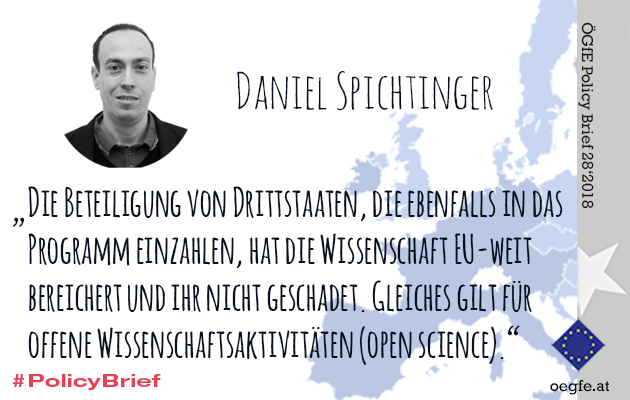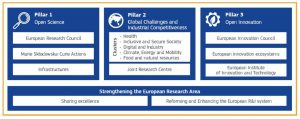Policy Recommendations
- Keep EU funded research appropriately financed: The research part of the next EU budget, the so called “Multiannual Financial Framework”, must be protected against cuts and ring-fenced to ensure a funding of at least 100 billion € for research and innovation between 2021 and 2027.
- Keep EU funded research excellent: Scientific excellence, not the geographic location of the applicant(s), must remain the basis for EU research funding decisions, although flanking measures are needed to address the research and innovation gap between EU members.
- Keep EU funded research open: The participation of non-member states, which also pay into the programme, has enriched and not harmed EU science. The same is true for open science activities.
Abstract
This policy brief describes the main issues connected with the development of the EU’s new framework programme for research and innovation, Horizon Europe, which is scheduled to replace the current programme, Horizon 2020, as of 2021. In June 2018 the European Commission published its proposal for Horizon Europe, which is currently under negotiation within and between the European Parliament and the EU’s Council of Ministers, with the Commission acting as facilitator. Although EU research policy is widely considered technocratic and remains virtually unknown among the wider public, the development of a new framework programme can be seen as a test case for the EU’s ability to achieve concrete results and its capacity to bridge diverging interest among its’ members. In particular, the debates around Horizon Europe have focused on the following issues: (i) the research and innovation gap between poorer and richer member states and whether addressing this issue should be a focus of the new programme, (ii) new activities for boosting innovation and impact of EU research and (iii) potential restrictions concerning the openness of the programme to non-EU countries. The budget of the programme, still to be agreed by Finance Ministers as part of the EU’s long term budget (the Multiannual Financial Framework), is also likely to be controversial, with many stakeholders fearing cuts to the already modest proposal from the Commission.
****************************
Alive and well? The new Horizon Europe programme for research and innovation as a test case for the EU’s ability to act
From Horizon 2020 to Horizon Europe
Since the early 1980s the European Union has provided funding for joint scientific research projects, supporting individual researchers and larger consortia of universities, research organisations as well as businesses and industry across Europe, through multiannual funding programmes referred to as the “framework programmes for research and innovation”. Some of the activities in the framework programmes are intended for individual researchers (so called “mono beneficiary actions”), with others targeting consortia of research performing organisations (so called “multi beneficiary actions”). Despite the fact that it is largely unknown to the wider public, the current framework programme Horizon 2020 (running from 2014 to 2020), has supported ground breaking research on issues ranging from cancer treatment to exoplanet detection and climate change mitigation, to give just a few examples.[1]
Among the novel elements proposed by the Commission for Horizon Europe is a stronger focus on innovation.
In June 2018 the European Commission published the proposal for the successor of Horizon 2020, entitled Horizon Europe, which is supposed to come into force beginning of 2021. Adopted under the premise of “evolution not revolution”, the new proposal takes over many of the successful features of its predecessor Horizon 2020[2]: like Horizon 2020 Horizon Europe will have a three-pillar structure with funding foreseen for fundamental as well as applied research. Among the novel elements proposed by the Commission for Horizon Europe is a stronger focus on innovation. After all, one of the main criticisms of European Research and Development (R&D) is that there are fewer concrete products and services being developed from research than in other regions of the world.[3] The need to demonstrate the concrete impact of research on improving the lives of citizens is also behind a second new concept called “mission oriented research”. Described as “big science deployed to meet big problems” missions tackle concrete issues in a measurable way (potential examples given include achieving carbon neutral cities by 2030 or a plastic free ocean). They are tied to the realisation of the UN’s sustainable development goals.[4] The Commission also proposed a modest funding increase with a budget of 100 billion € foreseen for the funding period 2021-2027.
Figure 1: The three-pillar structure of Horizon Europe: Something for everyone?
Source: European Commission
Stakeholder representatives from universities, research organisations and industry were mostly happy with the European Commission’s initial proposal, although several of them criticised the funding as being too modest, given the fact that many other regions of the world invest much more in research and innovation than the 28 member states of the EU and the Framework Programme taken together. Concerns that innovation funding should not detract from funding fundamental scientific research were also voiced.
As with any legislation under the co-decision principle, the Commission proposal then moved to the European Parliament and the Council of Ministers, which need to find agreement within their respective institutions and then arrive at a compromise version acceptable to all institutions. However, once the Horizon Europe proposal – consisting of a draft Regulation and a Decision – entered the Parliament and the Council several contentious issues started to appear, which are described in greater detail below.
Horizon 2020 in the European Parliament: cohesion instead of excellence?
Dan Nica, a Romanian Member of the European Parliament (MEP) from the Progressive Alliance of Socialists and Democrats (S&D) and one of the two so called rapporteurs[5] for Horizon Europe, introduced a number of amendments in order to re-focus Horizon Europe towards bridging the research and innovation divide between EU member states by providing more funding for those countries that do not have a good track record in securing EU R&D funding. Although these amendments were toned down in the vote of the European Parliament’s ITRE[6] committee they would still weaken the focus on scientific excellence as the main evaluation criteria for research projects, which is worrying many stakeholders in the scientific system, in particular since the Commission proposal already includes measures to address this issue under a dedicated funding line called “sharing excellence”.
So far, the Framework Programmes have been an important part of the EU’s soft power, in that many countries outside of Europe have been participating.
The initial amendments in the European Parliament also foresaw to further restrict the participation of countries outside the EU in Horizon Europe. This applies in particular to new associations of non EFTA (European Free Trade Association) and EEA (European Economic Area) countries, such as the UK in a post-Brexit scenario. So far, the Framework Programmes have been an important part of the EU’s soft power, in that many countries outside of Europe have been participating. Needless to say, these countries, which include Switzerland, Norway and Israel, have also paid into the programme. After considerable debate, these amendments were not successful in the European Parliament, although some doubts remain whether associated countries would be able to participate in mono beneficiary actions such as the Marie Skłodowska Curie Actions (MSCA) or European Research Council (ERC) grants.
Budget wise the European Parliament asked for an increase in budget to 120 billion[7] and redistributed some of the budget away from the Innovation Council towards so called “sharing excellence actions”, in line with the focus on bridging the R&I divide.
Horizon Europe in the Council: Failure or success for the Austrian presidency?
In a different reality, the Austrian presidency could have prioritized Horizon Europe as a case study on how EU cooperation brings added value not only to researchers but also to the economy and society.
Under the motto “A Europe that protects” the Austrian presidency’s public communication strategy has focused almost exclusively on migration, an issue that was instrumental in bringing the ruling coalition to power last year. The fact that Austria is in the driving seat of planning EU research policy for the next seven years has unfortunately not made it on the list of its presidency priorities published by the Federal Chancellery.[8] Even in the extended presidency programme, research is only mentioned in passing.[9] This fits with a world view that regards research policy as “money for the nerds ”. In a different reality, the Austrian presidency could have prioritized Horizon Europe as a case study on how EU cooperation brings added value not only to researchers but also to the economy and society. In this regard, the Austrian presidency has to be evaluated as a failure for promoting EU research to a broader audience.
However, Horizon Europe was of course the main priority for Austrian Federal Ministry of Education, Science and Research and on the technical level the Austrian presidency has been successful in securing an agreement on the Horizon Europe Regulation among member states, the so called “Partial General Approach” (partial because the related budget is not part of it as it is negotiated by finance ministers) due to the diplomatic skill and the tenacity of the staff involved.
Initial discussions in the Council of Ministers focused on the European Commission’s proposal to broaden the legal base of Horizon Europe to ensure that the research programme can also fund industrial development and early commercialisation activities. However, most of the member states declined the double legal base for the specific programme. The Commission’s proposal thus seems unacceptable to the Council in this regard.
Discussions also focused on R&I partnerships, which make up part of pillar II of Horizon Europe, with several member states wanting to secure a cap on the money that can be spent on these initiatives, which often involve big industry but leave little room for Small and medium-sized enterprises (SMEs). In the end, Austria found consensus around a commitment to allocate a “majority” of funding in pillar II outside of these partnerships.
However, the Council remains divided on several other issues which will need to be solved by the Romanian presidency, which follows Austria.
However, the Council remains divided on several other issues which will need to be solved by the Romanian presidency, which follows Austria. For the regulation this concerns the European Institute of Technology, synergies with other programmes and the association of third countries (the later excluded by the Commission due to ongoing Brexit negotiations). As for the specific programme, the areas of missions and areas of partnerships also need to be decided on.
Crunch time for Horizon Europe
As we have seen, the European Parliament and the Council of Ministers have internally debated different issues connected with Horizon Europe. Additionally to the technical issues on which these two institutions have to find a compromise in the so called trialogue (with the European Commission acting as a trusted third party) two aspects further complicate the picture.
Some stakeholders fear that in this case Horizon Europe might not start on 1st January 2021, straight after the old framework programme runs out.
The first of these is simply time. There has been some concern that, if differences among and between the Council and the Parliament are not resolved before the 2019 European Parliament elections, this will lead to significant delays in the political approval process. Some stakeholders even fear that in this case Horizon Europe might not start on 1st January 2021, straight after the old framework programme runs out. This would lead to a funding gap in research and innovation which is a bleak perspective for many European universities and research organisations, which depend on EU funding. However, others point to the fact that negotiations have to be completed only by the end of 2020 and that this could be accomplished even with a new Parliament and Commission. After all, the previous framework programme, Horizon 2020 was only agreed upon end of 2013 and entered into force in 2014.
If net payer contributions to the EU budget are not increased, severe budgets cuts will be necessary.
The second and more worrying threat concerns the budget. Discussions on the EU’s overall budget, the so called Multi-Annual Framework Programme (MFF), of which the spending on research and innovation forms a part, are expected to be tough. Together with the Netherlands, the Austrian government has led the hard-core opposition to any increase in their contributions to the EU budget. However, such an increase will be essential just to replace the British contribution. If net payer contributions to the EU budget are not increased, severe budgets cuts will be necessary. Given the fact that only 6% of the EU budget is spent on administration, this budget post cannot be cut much more without endangering the basic function of the European institutions. Of course, there are other policy areas – such as agriculture – that could be cut, but farmers have a notoriously strong lobby, which does not hesitate to cover Brussel’s European district in agricultural products during protest actions. Currently, umbrella organisations of researchers simply do not match these drastic tactics. So far, at least, Brussels has not seen a single protest of angry researchers. The research budget is therefore an easy target to cut and while Minister Faßmann has pledged to defend the 100 billion € budget proposed by the Commission, it is by no means certain he will succeed.
But not everything is bleak: as for the time issue, all stakeholders have shown willingness to work constructively in order to avoid a funding gap. And while the Commission has acknowledged that discussion on the EU budget are time intensive, Commissioner Oettinger has emerged as a champion for increased R&D funding.[10]
Whether Horizon 2020 will start in time and whether it is possible to secure appropriate funding for R&D is therefore an indicator on whether the European Union is still able to act “in the spirit of compromise” that has been a foundation for its success so far.
While often seen as technocratic, the processes surrounding research policy are a good example to evaluate the EU’s effectiveness in achieving concrete results and in bridging the differences between its members. The discussions were often portrayed as being between the EU13 and the older member states but this is only partially true. However, the debates do reflect the research and innovation gap between poorer and richer member states. Whether Horizon 2020 will start in time and whether it is possible to secure appropriate funding for R&D is therefore an indicator on whether the European Union is still able to act “in the spirit of compromise” that has been a foundation for its success so far.
[1] For more examples see https://ec.europa.eu/commission/sites/beta-political/files/budget-may2018-research-innovation-success-stories_en_0.pdf
[2] For a detailed overview of the current programme Horizon 2020 see http://ec.europa.eu/programmes/horizon2020/sites/horizon2020/files/H2020_inBrief_EN_FinalBAT.pdf
[3] See European Commission (2017) LAB – FAB – APP. Investing in the European future we want Report of the independent High Level Group on maximising the impact of EU Research & Innovation Programmes
[4] See Mazzucato (2018). Mission-Oriented Research & Innovation in the European Union, A problem-solving approach to fuel innovation-led growth
[5] Rapporteur: MEP in charge of preparing a report on a specific issue. For details see http://www.europarl.europa.eu/news/en/headlines/eu-affairs/20150328STO39002/from-rapporteur-to-coordinator-the-different-roles-taken-on-by-meps
[6] Committee on Industry, Research and Energy (ITRE)
[7] This increase has also been supported by Nobel prize winning scientists and CEOs: https://www.ert.eu/sites/ert/files/2018_11_30_-_letter_horizon_europe_-_eu_multiannual_financial_framework.pdf
[8] See https://www.eu2018.at/agenda-priorities/priorities.html
[9] Programme of the Austrian Presidency, p. 47 https://www.eu2018.at/dam/jcr:52862976-3848-403e-a38a-6aac8bcbe34d/Programme%20of%20the%20Austrian%20Presidency.PDF
[10] https://sciencebusiness.net/framework-programmes/news/political-battles-force-go-slow-eu-budget-negotiations
I would like to thank Kurt Deketelaere and Laura Keustermans from the League of European Research Universities as well as Julia Prikoszovits from the Austrian Federal Ministry of Education, Science and Research for their valuable input. Responsibility for the content and any errors remains with the author.
ISSN 2305-2635
The views expressed in this publication are those of the authors and not necessarily those of the Austrian Society of European Politics or the organisation for which the author works.
Citation
Spichtinger, D. (2018). Alive and well? The new Horizon Europe programme for research and innovation as a test case for the EU’s ability to act. Vienna. ÖGfE Policy Brief, 28’2018








